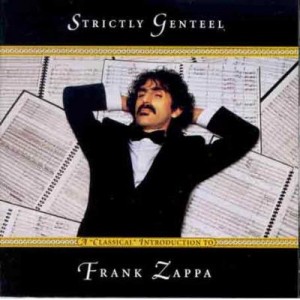As I mentioned in my last post, Zappa was very concerned with producing some kind of synthesis of art and pop. He frequently alluded to how Varèse and Stravinsky were on equal footing with the R&B and blues records he listened to while he was growing up. It seems like he wanted to make something new by combining these two kinds of music.
A lot of the time, this motivation is expressed through ironic juxtaposition. I’m referring to songs that cram “high” art in with the “low” and relish in the awkwardness of the pairing. (Think of “Amnesia Vivace” on Absolutely Free. There, in a very short span, we get two quotations of music by Stravinsky–for Zappa, one of the greatest examples of so-called high art–alongside a reference to the “Duke of Earl.” Very unlikely bedfellows…)
Why would he do this? Continue reading “The Inherent Paradox of Crossover Music”
